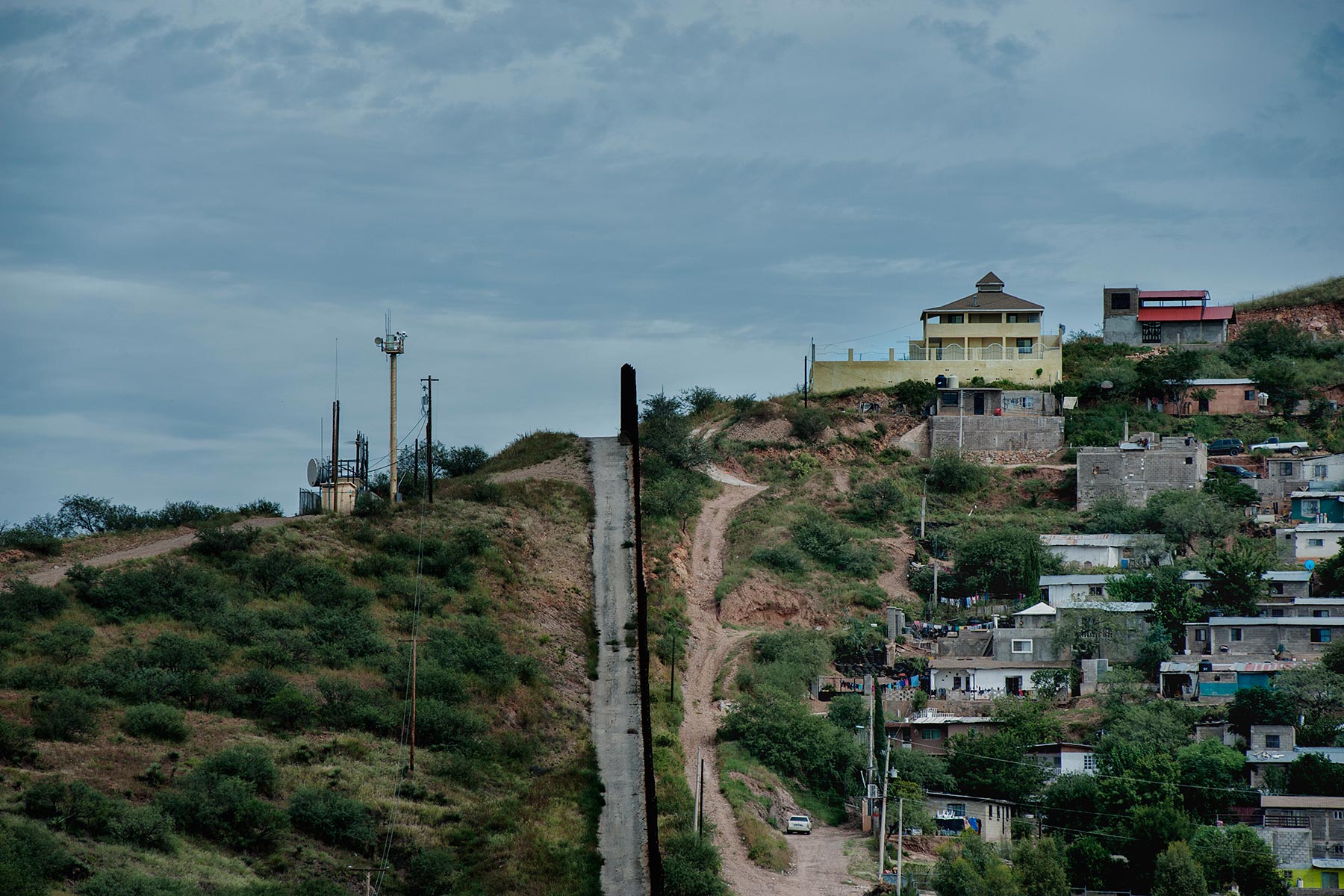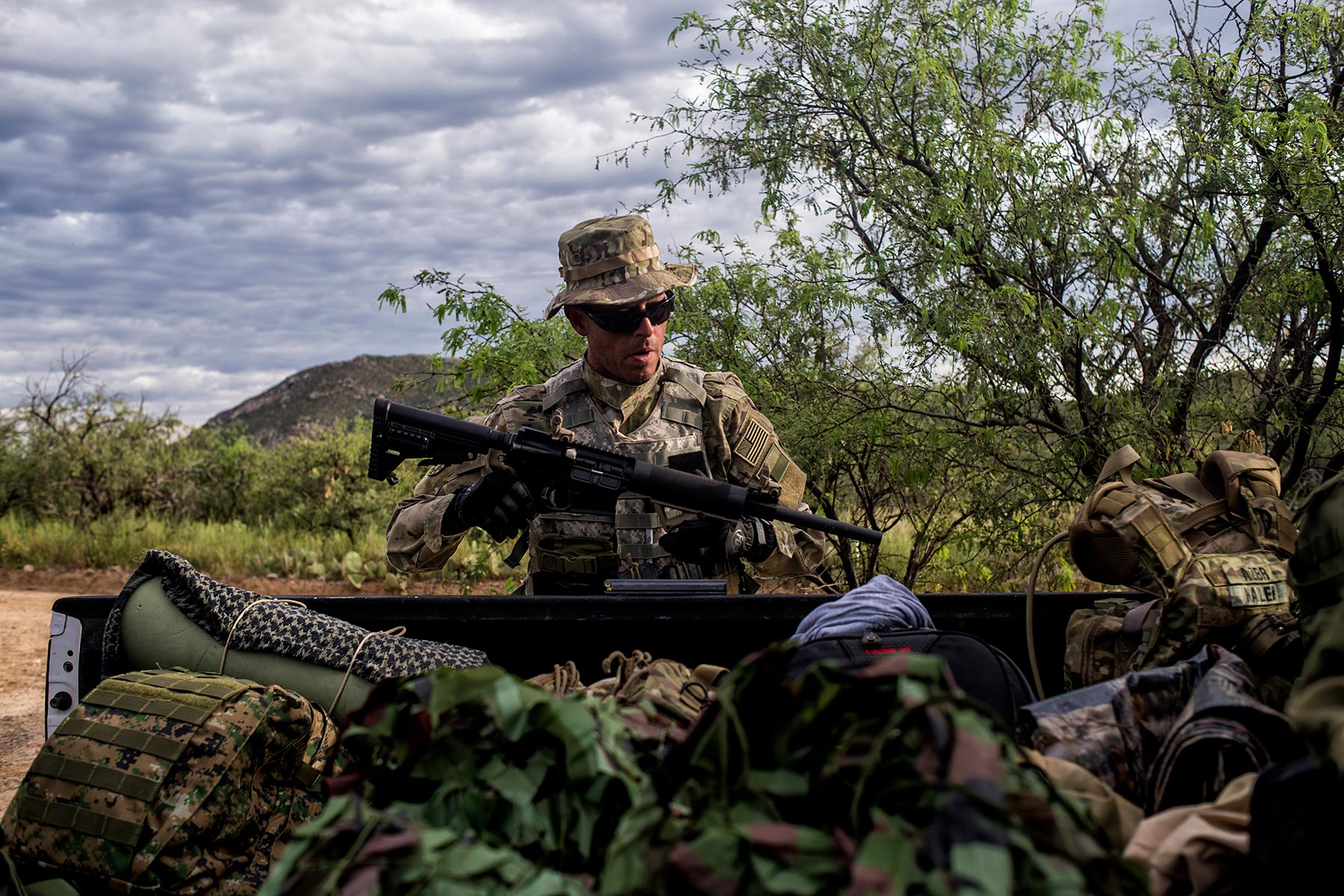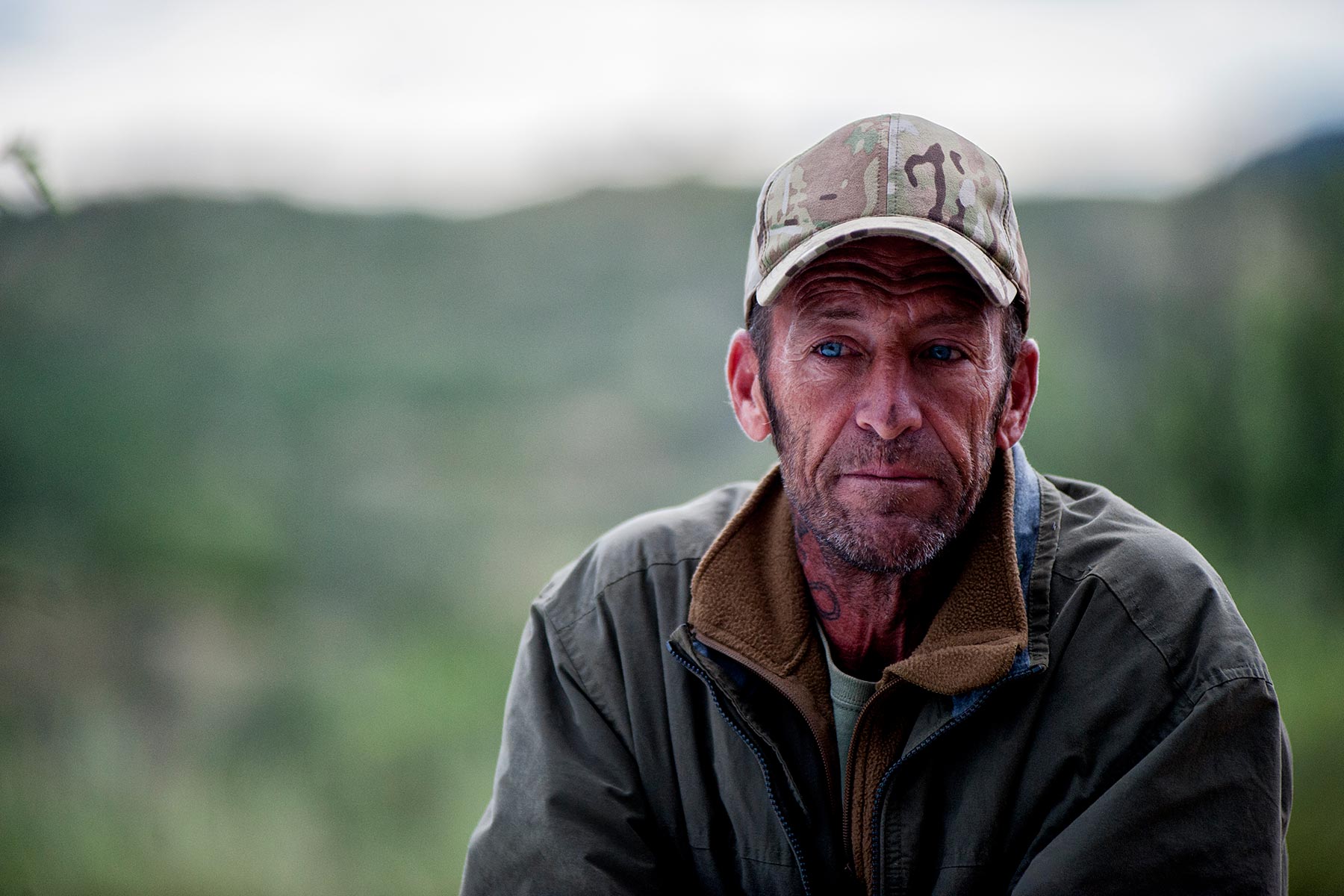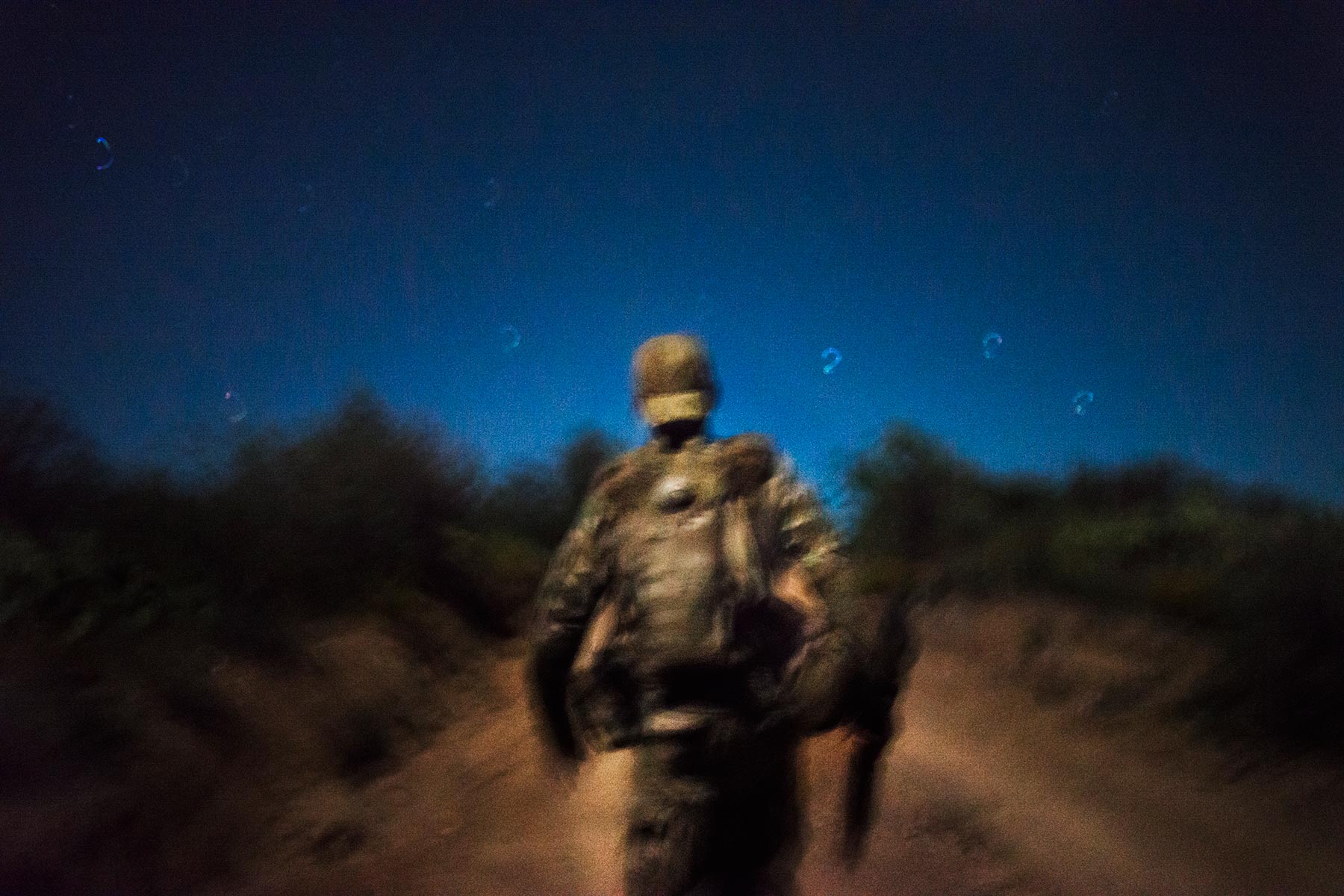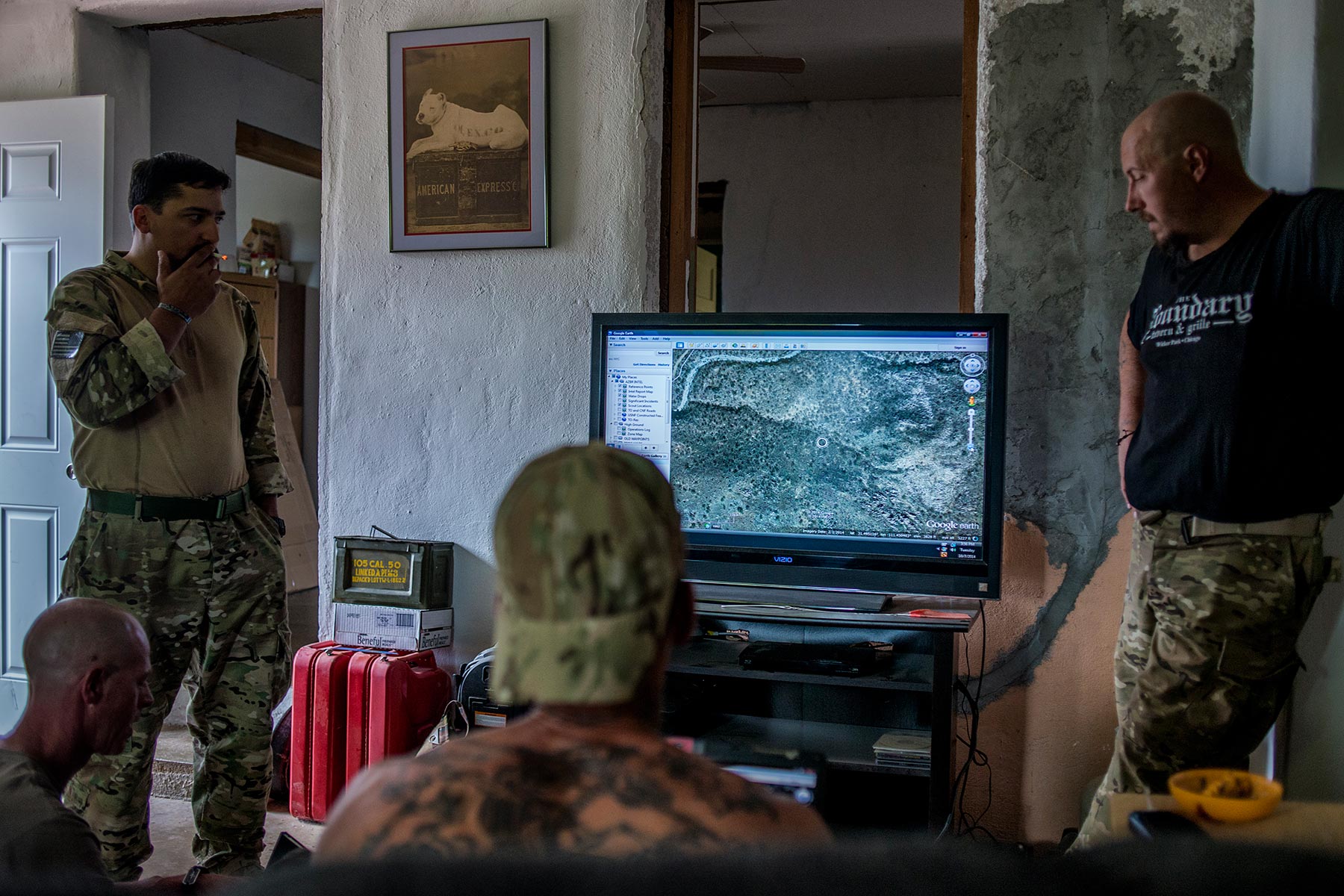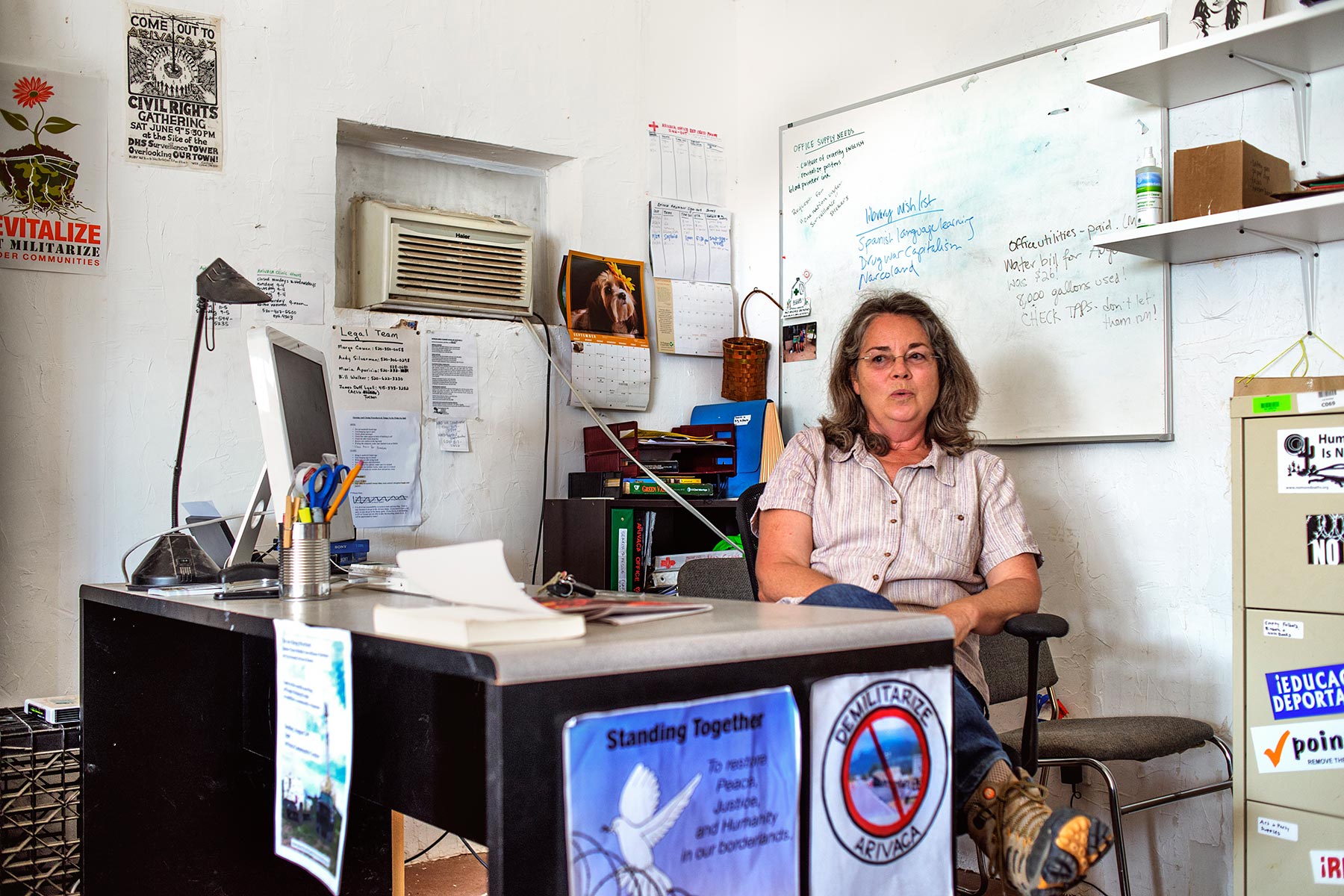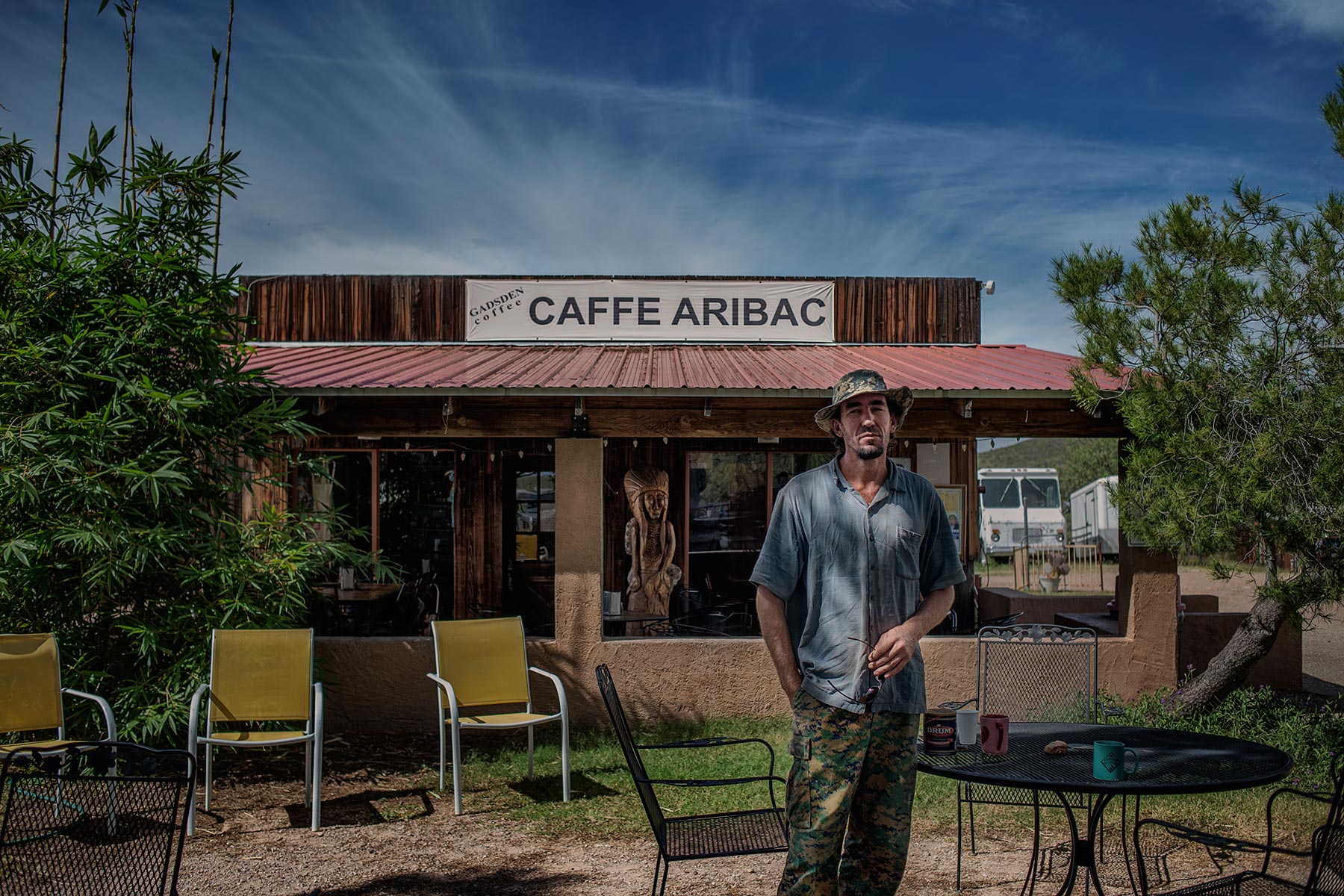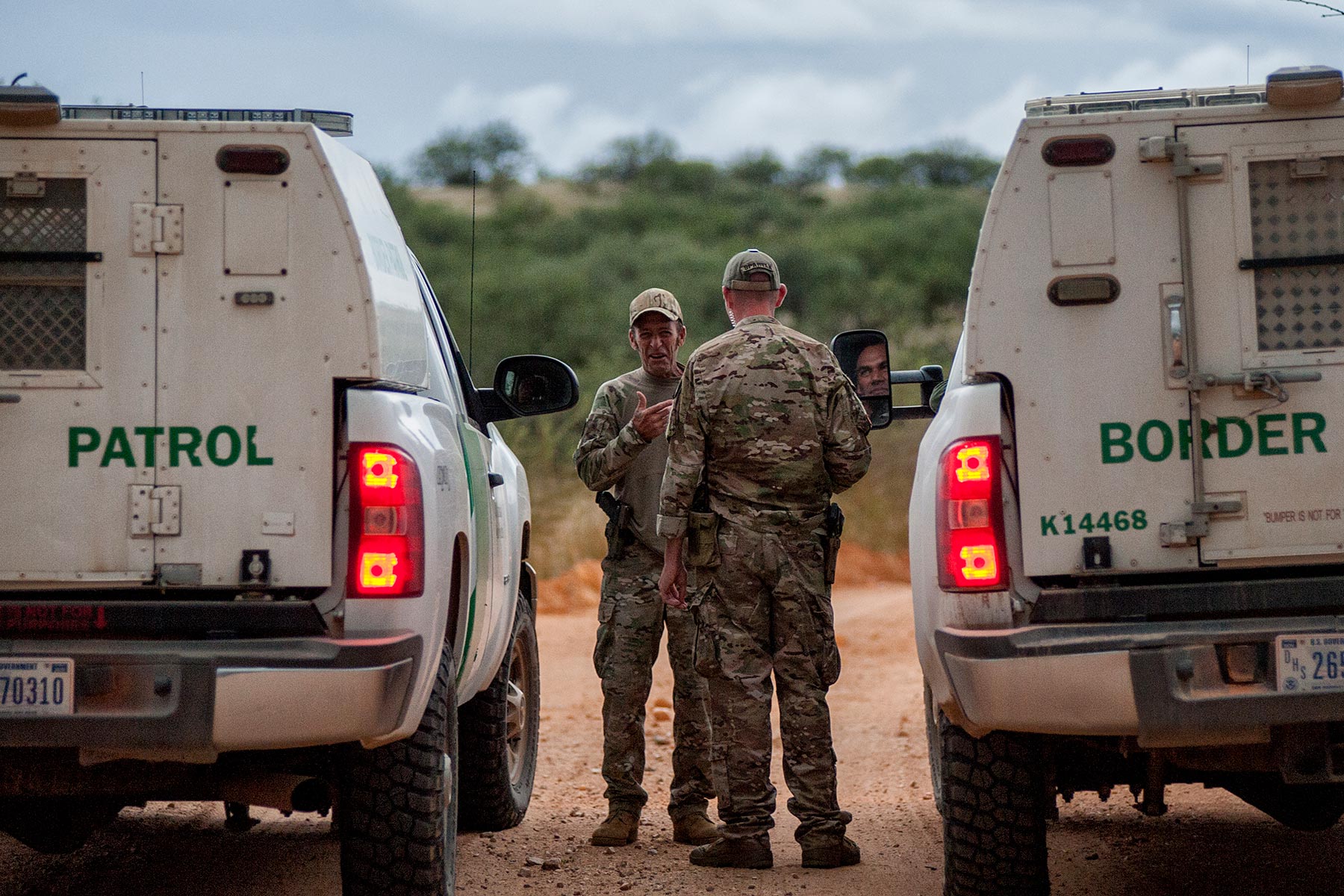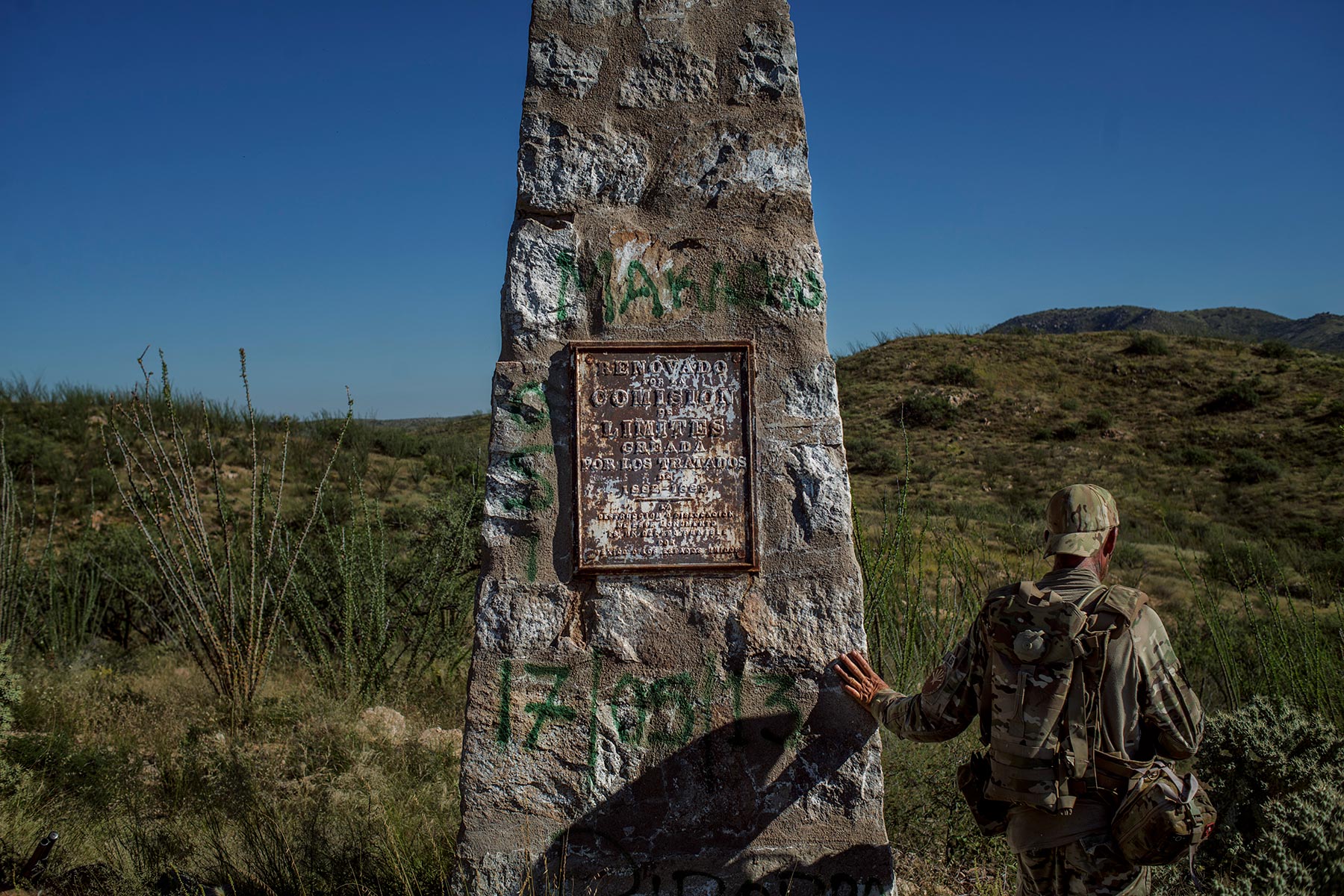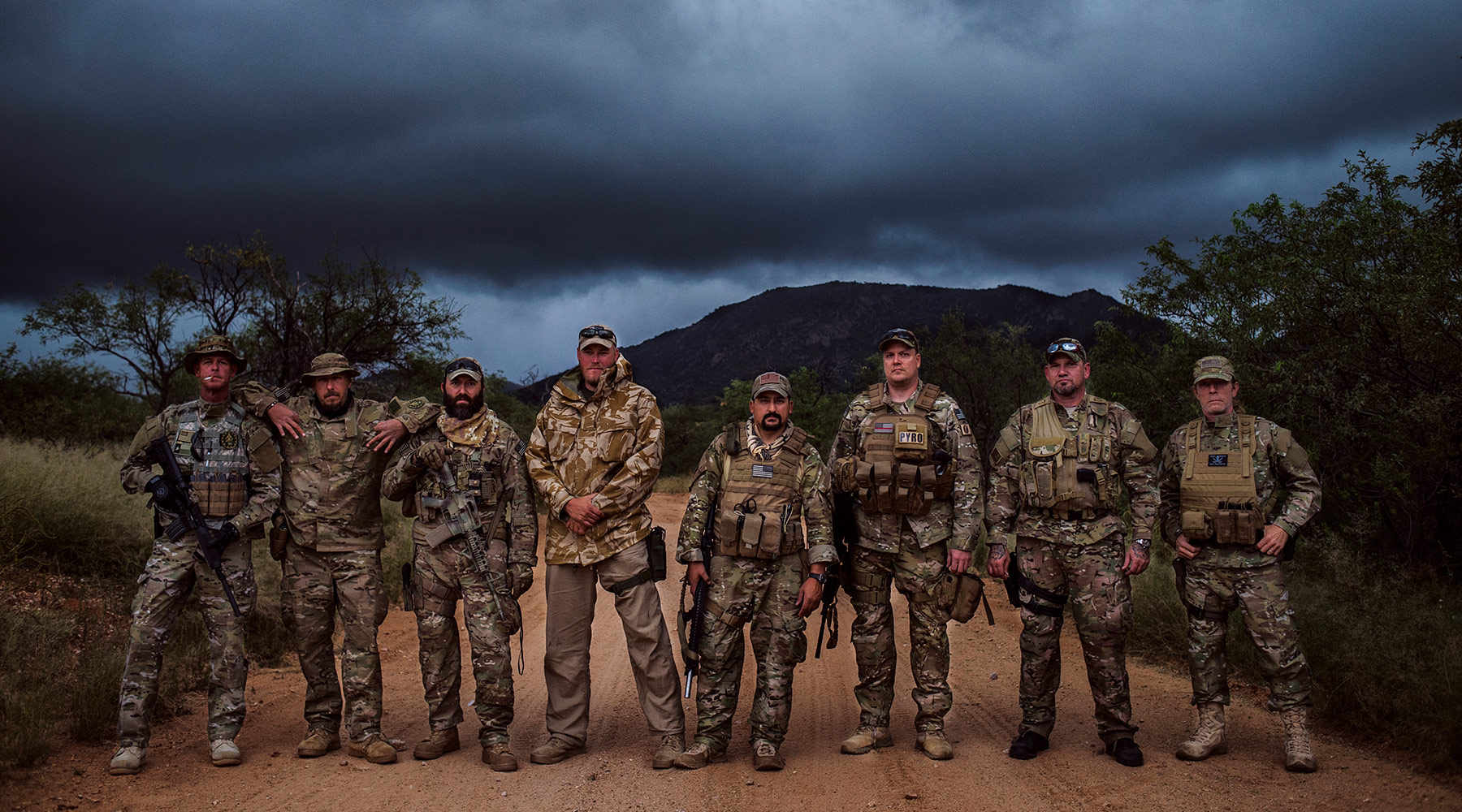
Desert Hawks
Paramilitary veterans group stakes out US-Mexico borderlands
By Tim Gaynor for Al Jazeera America
Photos by Johnny Milano for Al Jazeera America
Edited by Kate Kilpatrick, Mark Rykoff
Members of the Arizona Border Recon pause for a group photo. For some, this was their first time out with the team.
Published on Sunday, October 26, 2014
NOGALES, Ariz. — A former U.S. Marine Corps combat veteran, dressed in camouflage, scans Mexican radio traffic as he sits beneath a mesquite tree in the moonlight in southern Arizona about a mile north of the border with Mexico.
Using a field radio and military-style calls signs, he talks to two other reconnaissance teams of veterans with night-vision gear and semiautomatic weapons stationed at lookout posts on nearby hilltops, alerting them to possible drug-smuggling activity on the southern side.
“Right now … It’s kind of a Mexican stand-off,” said “Spartan,” who said he served tours in Iraq and Afghanistan and asked not to be identified by name. “They are basically waiting for the Border Patrol shift change, and when that happens, probably we will be able to stop that,” he said, referring to the suspected drug mules trying to cross the border.
He was among veterans from states such as Arizona, Maryland, Texas and Wyoming who took part in a weeklong reconnaissance operation in the remote high-desert corridor some 30 miles west of the border city of Nogales.
Arizona Border Recon (AZBR) draws on former military, law enforcement and private security contractors for controversial, multiday stakeouts to observe and report activity along a stubbornly persistent drug trafficking corridor on the Arizona-Mexico border that has a history of vigilante violence. AZBR runs six to eight operations a year
On one recent evening, six of nine volunteers in the rugged cactus- and brush-studded borderlands were Army, Marine Corps and Navy veterans, the group said, although Al Jazeera America could not independently verify the claim. They wore camouflage uniforms, some with patches marking their call signs, blood group and a logo showing an eye framed by a star, reading “Numquam dormio,” Latin for “I never sleep.”
The group carried infrared strobes — to make themselves visible to Border Patrol at night — toted AR-15-type rifles, semiautomatic pistols and shotguns and ate military field rations.
“The oath that we took when we joined the military was an oath to protect the Constitution and the country against foreign and domestic enemies … and that doesn’t end when you leave the military,” said AZBR founder Tim Foley, who goes by the tag “Nailer.”
Border militias grabbed headlines this summer as several groups toting guns and dressed in camouflage popped up from Arizona to South Texas in response to a surge in the number of undocumented child migrants from Central America crossing the Rio Grande, raising concerns of potential civil rights violations and the possibility of clashes with federal police.
Founded four years ago, the paramilitary AZBR has five permanent members and can draw on some 200 volunteers from around the country, 90 percent of them veterans, said Foley, a 55-year-old who said he served as a paratrooper in the 82nd Airborne Division for four years starting in 1978.
“Everything’s coming across this border. Dope, disease, scumbags, terrorists … (and the government is) not doing what it’s supposed to be doing — protecting our country,” he added as he trotted along a moonlit trail searching for border crossers, a shotgun clasped in his hand.
Volunteers have to sign the group’s standard operating procedure and rules of engagement setting out the legal framework for any encounter with border crossers in the rugged back country — part of the Border Patrol’s Tucson sector, where agents last year seized nearly 600 tons of marijuana and made more than 120,000 arrests.
“We don’t violate anybody’s rights. I’m pretty sure you have to be a citizen in the first place to have rights in this country, but … we don’t treat anybody badly,” Foley said. “We don’t pistol-whip them, beat them, do any of that stupid shit. We treat them as human beings.”
Should they encounter a group of suspected undocumented migrants, volunteers may detain them, conduct a cursory search for weapons and inspect them for any medical needs while they call Border Patrol to effect an arrest, according to the group’s procedures.
If volunteers encounter armed border crossers, the AZBR members order them to lower their weapons and put their hands up, while keeping guns at “the low ready,” with fingers off the trigger, prepared to use deadly force if necessary, Foley said.
“Everyone knows what a racking 12-gauge shotgun sounds like. If you don’t, you’d better learn what it sounds like, because if somebody does it to you, you’d better stop dead in your fucking tracks,” he said, adding that he had not yet had to do so on a stakeout.
The night passed without any confrontation with border crossers. Foley declared the operation a “soft victory,” saying their presence deterred smugglers from crossing in the area.
Late in the morning, volunteers dressed in MultiCam camouflage hiked back from their observation posts and clambered into two trucks for a 10-mile ride back to a rented house in the border hamlet of Sasabe (population 54) that AZBR members refer to in military parlance as their FOB, or forward operating base. The air was thick with cigarette smoke and barracks banter. A semiautomatic pistol lay in the middle of the coffee table.
“After you get out [of the military], you want to continue to help out … I felt that doing the most good would be actually coming down here and doing something that actually affected America instead of fighting a war somewhere else,” said Kyle Erickson, 31, of Wyoming, who said he served two tours in Afghanistan and one in Iraq as an Army combat engineer.
“It says in the name ‘recon.’ We’re out there to watch. And, like, we did. We watched. We stopped their operation from doing what it needed to do last night. To me, that’s the biggest win there is, not necessarily us capturing people,” he said.
The mountainous strip is traversed by undocumented migrants on foot and drug mules toting marijuana in makeshift backpacks, sometimes accompanied by armed guards to ward off bandits. Erickson said he initially had a legacy get-’em response when he set off after a group of border crossers but took a step back.
“These people are not at war with us, and most of them are doing it to make a living or have a better life. It’s not necessarily about they’re here to hurt me, because 90 percent of them are not. So I’m not trying to pull a weapon on them every time I hear a noise,” he said.
Puerto Rico–born Manny Vega, 29, said he did four tours in Iraq during his nearly nine years of service with the Marines. He felt the AZBR operation, his second, gave him a chance to use his skills to uphold U.S. sovereignty at the border while laying down fresh memories of his service that left him medically retired with post-traumatic stress disorder and traumatic brain injury.
The camaraderie of carrying out the operations with other combat veterans also helped him come to terms with the trauma of a bomb blast in Iraq in 2004 that injured him and killed his comrade Nachez “Little Fawn” Washalanta II, whom he commemorates with a wristband.
“I have nightmares. I do have thoughts of my friend dying. I do have thoughts of being blown up with an IED,” he said. “For me, it is therapeutic to come down here and join my fellow veterans … This is making new memories for me.”
The paramilitary group’s border reconnaissance activities have sparked concern among some residents in the nearby town of Arivaca (population 700), about 15 miles away over the rugged mountains, which has a bloody recent history of vigilante violence.
“They may be very well trained in all kinds of ways, especially in terms of shooting people. But that doesn’t really make for trained law enforcement. They are two very different things,” said Leesa Jacobson, who runs a humanitarian aid office offering water and other help to migrants crossing through the corridor near Arivaca, where scores have died over the years.
In 2009 the community was shaken by two murders committed by border vigilantes. Shawna Forde, the leader of Minuteman American Defense, and two accomplices were convicted of shooting dead a local man, Raul Flores, and his third-grade daughter, Brisenia, after entering their home in the hope of finding drugs, weapons and money to bankroll the group’s activities.
Jacobson keeps a picture of 9-year-old Brisenia on the wall of her office as a “reminder of what can happen out of fear and militarization out of control.”
“Militia, in my opinion, has brought nothing but misery to southern Arizona,” she said. “We don’t need any more people with guns out there. We have plenty of federal people with guns out there.”
Local leatherworker, gold panner and hunter Chad Peterson, meanwhile, who said he has lived in Arivaca for 12 years, remained ambivalent about the AZBR after encountering what he said were armed drug mules dressed in camouflage while he was hunting deer in the mountains south of the town.
“Part of me is like, it sounds like vigilante justice perhaps — or the potential is there — and we don’t really need that,” he said, chatting at a local cafe, his rifle beside him on the table. “But at the same time, I have seen loads coming across with dudes in camouflage. So I guess I feel like maybe there’s a need for it, so long as they’re only just reporting and not acting on the info. But how could they ever be held accountable for that?”
A lack of accountability is just one of several concerns that local law enforcement in southern Arizona has about border militia groups.
Aside from the murders committed by Forde, who is now on death row, the white supremacist founder of another Arizona militia, American Border Guard, Jason Todd “J.T.” Ready, was suspected by the FBI of domestic terrorism offenses. In 2012, Ready shot dead his girlfriend and three others, including a toddler in the Phoenix valley before turning a gun on himself.
Foley came under FBI scrutiny in 2011 after agents received an anonymous tip that he was building pipe bombs and leaving them on trails frequented by border crossers. The FOB was searched, but Foley was never charged or arrested.
“Law enforcement has a very intensive system of selecting people … When people come into a group, they don’t have that,” said Tony Estrada, the sheriff of Santa Cruz County, where AZBR conducted part of its recent recon operation and where a different shotgun-wielding militia group mistook a group of conservationists counting bats for undocumented migrants or traffickers in late August.
“You are going to get a lot of crackpots. You’re going to get a lot of people that shouldn’t be there. I think that has happened before — some of the organizations find out that, you know, ‘This guy is not what we want. He’s a troublemaker. He’s gung-ho. He’s going to get us into trouble.’”
Estrada also questioned what impact a militia group would have staking out the border in a county like Santa Cruz, which he said has among the most federal, state and local police per capita in the United States.
“When you have about 1,000 Border Patrol, local state and federal agents, and you have a group of five to 10 militia men, it’s not going to make a difference,” he said. “And it could create problems for them and for innocent bystanders.
The AZBR has a close working relationship with the Border Patrol. Al Jazeera America witnessed Foley sharing information with agents patrolling a dirt road near Sasabe on at least four occasions. On another, an agent stopped by the group’s FOB to find out details of its operations as he went on shift.
U.S. Customs and Border Protection, the parent agency of the Border Patrol, released a statement in the summer saying that it “appreciates the efforts of concerned citizens as they act as our eyes and ears” but “does not endorse or support any private group or organization from taking matters into their own hands as it could have disastrous, personal and public safety consequence[s].”
The statement came after a Border Patrol agent pursuing a group of undocumented immigrants in a wooded border area in South Texas reportedly fired several shots at an armed man who later identified himself as a militia member, creating concerns over public safety, although no one was hurt in the incident.
Despite doubts about the group’s activities, Foley, who works in Phoenix as a contractor, said he has no plans to stop the stakeouts.
“We’re going to keep doing it until [the border’s] fixed or I’m dead,” he said. “Hopefully I can get the hell out of the city and move here and do it all the time.”
